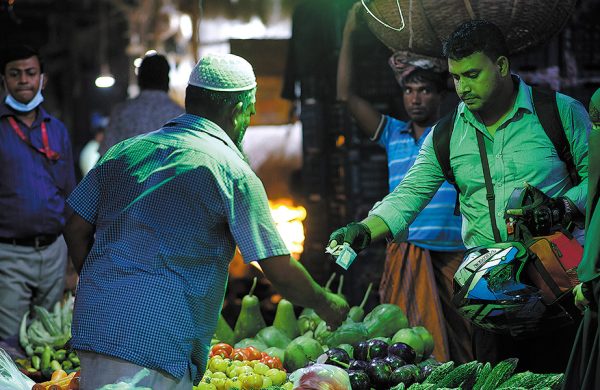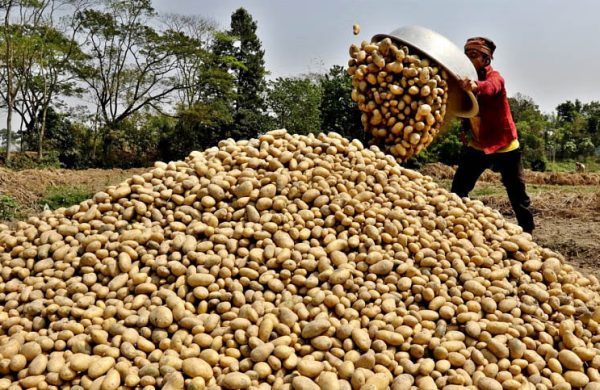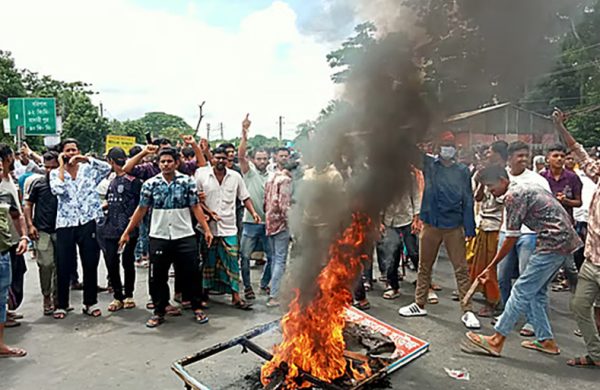BD households reel under persistent inflation
- Update Time : Thursday, July 3, 2025

Staff Correspondent:
Despite a recent marginal dip in the national inflation rate, persistently high prices continue to inflict significant hardship on lower and middle-income households across Bangladesh, severely eroding their purchasing power and forcing many to seek alternative income sources.
The prolonged period of soaring costs has made every essential purchase a test of resilience for families whose incomes often struggle to keep pace with the rising cost of living.
Kawser Mia, a private sector employee in Tejgaon, exemplifies the escalating financial strain. In 2016, he borrowed Tk10 lakh from a bank at an 8 percent interest rate to repair his village home in Mirzapur, Tangail. on Thursday his loan installment has surged to a daunting 15 percent interest, nearly double the original rate.
“The loan installment has increased severely, now consuming around 65 percent of my salary,” Kawser lamented. “It was flexible when I first borrowed, but now it has become very burdensome.”
To cope with the drastically increased payment and other family expenditures, Kawser has been forced to work as a street vendor after his regular job.
He, like many others, finds himself in distress due to the impact of inflation adjustments in the banking system, which have led to higher interest rates for consumers. This situation has driven many middle and low-income individuals to seek additional employment, with some turning to street vending in Dhaka and other cities.
INFLATION’S BROAD IMPACT:
SM Nazer Hossain, vice president of the Consumers Association of Bangladesh (CAB), told journalist that inflation has adversely affected the living standards of both service holders and farmers in urban and rural areas. Despite CAB’s efforts to advocate for lower consumer goods prices, food costs remain elevated, often attributed to hefty production expenses.
Hossain highlighted the unexpected rise in rice prices immediately after the Boro season, noting that many large companies are now engaged in rice trading, selling packaged rice for over Tk100 per kg.
“This profit encourages big companies to buy paddy from farmers at lucrative offers at the village level,” Nazer Hossain explained.
“Once they complete paddy collection, the rice price jumps to Tk80-90 per kg. Fine quality rice is not less than Tk88 per kg in Dhaka, severely impacting consumers’ purchasing power.”
DATA REFLECTS SUSTAINED PRESSURE:
The Bangladesh Bureau of Statistics (BBS) reported a national point-to-point inflation rate of 9.05 percent for May, with food inflation at 8.59 percent and non-food inflation at 9.42 percent. While these figures indicate a marginal improvement from previous months, the 12-month moving average inflation rate, which stood at a high 10.13 percent from June 2024 to May 2025, paints a clearer picture of the sustained pressure on household budgets over the past year.
For millions of Bangladeshis, this persistently high inflation means a drastic erosion of their purchasing power. Daily wage earners, small business owners, and fixed-income employees are finding it increasingly difficult to afford basic necessities. Food, a significant portion of their expenditure, remains a major concern even with the slight dip in food inflation, compelling families to compromise on the quantity and nutritional quality of their meals, impacting their health and well-being.
“Every trip to the market feels like a heavier burden,” shared Rahela Banu, a garment factory worker from Mirpur, echoing a widely felt sentiment. “Prices for rice, oil, vegetables – everything keeps going up, but our salaries don’t increase at the same rate. We have to cut back on so many things just to put food on the table.”
EXPERTS POINT TO DELAYED MEASURES AND POVERTY INCREASE:
Professor Mustafizur Rahman, a distinguished fellow at the Centre for Policy Dialogue (CPD), told journalist that the purchasing power of fixed-income groups has been severely affected by the long-prevailing high inflation.
“The government took measures to reduce inflation, but the inflation is reducing at a very slow pace, as the measures were taken late,” he added.
As a direct consequence, the rate of poverty has reportedly increased in both urban and rural areas, and protein consumption has remarkably decreased among lower and fixed-income groups, affecting their overall health and nutrition.
The financial distress is further compounded by the fact that wage growth, while showing some increases (the national point-to-point wage rate increased to 8.21 percent in May 2025), is often outstripped by the rate of price increases. This widening gap between earnings and expenses puts immense pressure on household budgets.
Middle-income families, often burdened by housing rent, children’s education, and healthcare costs, are also feeling the pinch. Many are resorting to dipping into savings, taking on debt, or delaying significant life purchases. The burden extends beyond food, as soaring costs for transportation, utilities, and healthcare add additional strain, making even a simple illness a potential financial crisis.
















